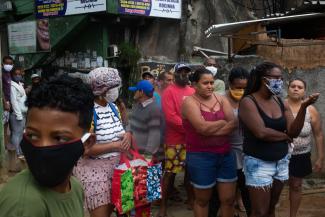Marginalised communities
Spreading dangerously

While Brazil’s President Jair Bolsonaro continues to downplay the Coronavirus crisis (see Gilberto Scofield Jr. in D+C's Covid-19 diary), his country has amassed the world’s second-largest number of confirmed cases. According to Worldometer, a reference website providing real-time statistics, 365,000 people had been infected in Brazil by 25 May, and 22,746 of them had died.
Things are particularly bad in the favelas as the informal urban settlements of poor people are called. There are more than 6,300 of these slum areas. An estimated 700 are in Rio de Janeiro, Brazil’s second-most populous city with 6.7 million residents.
In mid-May, the city had more than 20,000 Coronavirus cases, according to municipal data. The authorities do not collect statistics specifically for the favelas. However, Voz das Comunidade, a community newspaper based in one of the big favelas, collects data on the spread of the virus, using city data and its own sources. The newspaper’s database comprised only 13 favelas in mid-May. But even this limited number gives a good impression of the seriousness of the outbreak. The Voz database listed more than 440 confirmed cases and 159 deaths in the 13 communities alone.
It is obvious that the numbers for all favelas taken together must be much higher. Brazil has 13.6 million people living in favelas, according to Data Favela, a research institute. The data are from the “Favela Economy – Income and Consumption in Favelas” survey by Data Favela institutes 2020. Data Favela, a research institute, reckons that 2 million favela residents live in the state of Rio de Janeiro, and two thirds of them are black.
Favela residents are aware of the risks. “We know of some people who died of this disease here in the favela,” says Dulce dos Santos, 47, who lost her job as a domestic worker due to the disease. “A neighbour has been infected. I avoid leaving my house.”
High rates of infection and death do not surprise favela residents. “You don’t see much social distancing here, especially since businesses in the favela have not closed,” says William Rodrigues, 30, an unemployed favela resident. “The government is hardly present here.” Indeed, state presence all too often only means violent intrusion by heavily armed security forces.
Favela communities feel let down in other ways too. Rodrigues says: “I also don’t see any government efforts to help people with food or other basic necessities. Only a few non-government organisations come in to distribute baskets.”
In view of the health crisis, the national government has promised 600 Brazilian Reals (about € 95) to unemployed Brazilians. Many favela residents, however, cannot claim the money because they lack the required personal-identification document. This is particularly true of homeless people.
Brazil’s Unified Health System, known by its Portuguese acronym SUS (Sistema Único de Saúde), is overloaded, particularly in the slums. Some favelas suffer water shortages, which promote proliferation of the disease due to poor hygiene. Many residents continue to work – often in close proximity to others. They have no choice.
Thuany Rodrigues is a journalist in Brazil.
thuanyrodriigues@gmail.com







